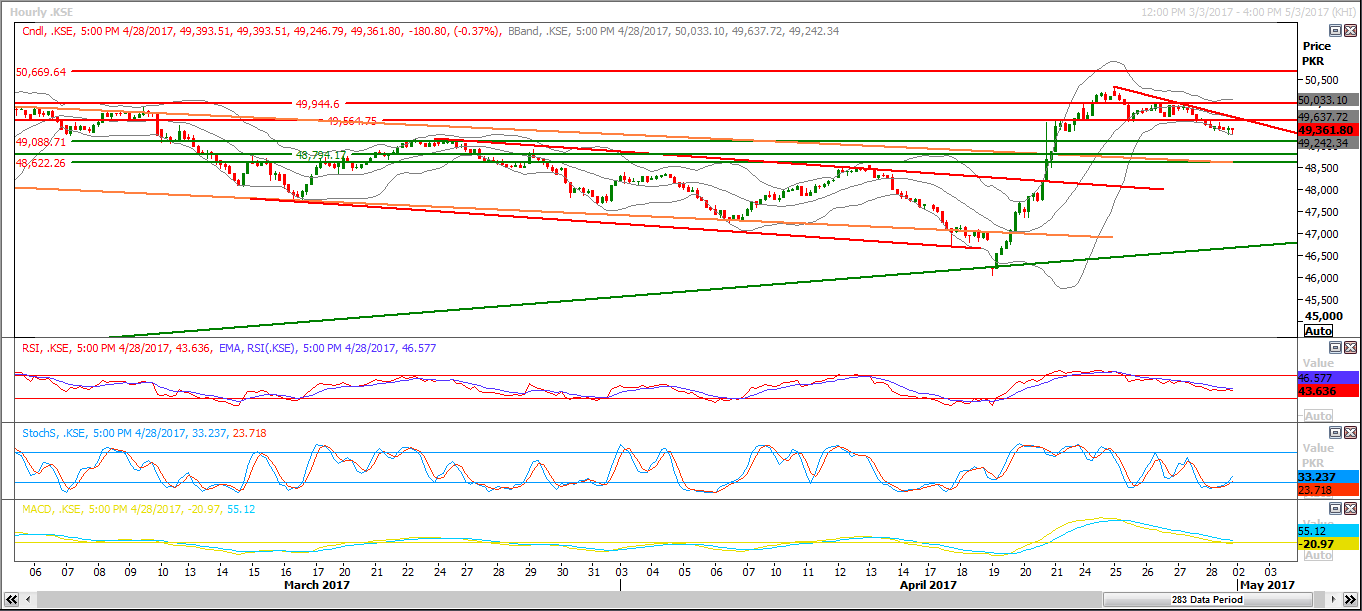Previous Session Recap
The Benchmark KSE100 Index opened at 49481.70, posted a day high of 49575.32 and a day low of 49238.05 during the last trading session, while the session suspended at 49300.90 with net change of -180.80 points and net trading volume of 112.55 million shares. Daily trading volume of KSE100 listed companies increased by 1.74 million shares or 1.57%, DoD basis.
Foreign Investors remained in a net selling position of 2.36 million shares and net value of Foreign Inflow dropped by 3.6 million US Dollars. Categorically, Foreign Individuals and Corporate investors remained in net selling positions of 0.03 and 2.51 million shares ,respectively. However, Overseas Pakistani Investors remained in a net buying position of 0.19 million shares. While on the other side. Local Individuals, Banks, NBFCs and Mutual Funds remain in net buying positions of 9.0, 9.35, 0.35 and 0.81 million shares, respectively. Local Companies and Brokers remained in net selling positions of 10.12 and 8.53 million shares.
Analytical Review
Asian shares advanced on Tuesday, helped by rising optimism on the technology industry and easing concerns over North Korea, while the dollar edged up to one-month high versus the yen. MSCI broadest index of Asia-Pacific shares outside Japan was up 0.1 percent, with many markets of the region reopening after a long holiday weekend. Japanese Nikkei rose 0.3 percent. On Wall Street, although the Dow Jones Industrial Average fell 0.13 percent on Monday, the S&P 500 gained 0.17 percent and the Nasdaq Composite added 0.73 percent to a record closing high. Notably, five largest companies the world by market capitalization -- Apple, Alphabet, Microsoft, Amazon and Facebook -- all hit intraday or closing highs - or both - on Monday.
The International Monetary Fund (IMF) has warned Pakistan and other oil importers that because of an increase in global prices, their oil bills for 2017 will be almost 30 per cent higher than the last year. “Any further increases could undermine consumption, increase fiscal risks, and worsen external imbalances,” the IMF warns in its May 2017 Regional Economic Outlook for the Middle East, the Gulf, and North Africa, Afghanistan and Pakistan (MENAP).
Statistics released by the national data-collecting agency paint an unflattering picture of exports, which came down 9 per cent annually between 2013-14 and 2015-16. In particular, textile exports that constitute about three-fifths of the total registered negative growth in July-March despite preferential market access to the European Union, largest foreign consumer of Pakistani goods. But every cloud has a silver lining. Recent data from the Pakistan Bureau of Statistics (PBS) shows a trend that may well be the forerunner of a reversal in Pakistani export fortunes. Imports of textile machinery jumped 21pc year-on-year to $401.1 million in July-March. Imports of electricity-generating machinery surged 76pc over the same period. Added megawatts of electricity to run the newly imported textile machinery is the herald of future export proceeds, according to Stefano Pontecorvo, Italian ambassador to Pakistan.
Almost all permanent positions in economic apparatus of the country — accounts, currency and revenue — are being run by temporarily-appointed personnel, even as the Pakistan Muslim League-Nawaz (PML-N) government prepares to announce its last federal budget later this month. The constitutional post of the auditor general of Pakistan (AGP) fell vacant for a second time in a month on April 28 following the retirement of ‘acting AGP’ Haque Nawaz, who served at the post for 18 days. The AGP is known as the keeper of the accounts of the state and is required to certify incomes and expenditures of the federal and provincial governments every year.
The business community on Monday condemned the finance ministry for rejecting the Ogra recommendations to slash petrol and high-speed diesel prices, urging the government to reduce rates of petroleum products as they had declined in international market. It is unfortunate that the finance minister kept the prices of petroleum products unchanged for the month of May despite the Ogra had recommended a decrease of Rs1.20 per litre in the price of MS 92 RON petrol, and Rs1.10 per litre in the price of High-Speed Diesel (HSD), they added. LCCI former vice president Kashif Anwar opposed the government for increasing the GST on HSD from 29.5 percent to 33.5 percent and GST on Motor Spirit excluding High Octane Blended Component (HOBC) from 15.5 percent to 20 percent. In the past, the government did not pass on the full benefit of declining oil prices to the public by imposing heavy taxes, he added.
Today DGKC, KEL, PPL and POWER will lead the market in the positive direction.
Technical Analysis
The Benchmark KSE100 Index is capped by a resistant trend line on the hourly chart and it has crossed its 23.6% correction in bearish direction, converting the bullish momentum into a bearish one. The Index has changed its trend from bullish market in bearish trend to completely bearish after closing below 49440 on the hourly chart. As of now, the supportive region is at 49088 and if the Index closes below the said level, then the next target could be 48622. Index may resist ahead at 49440 and 49560 on Intra-day basis.
 To Open picture in original resolution right click image and then click open image in a new tab
To Open picture in original resolution right click image and then click open image in a new tab


0 Comments
No comments yet. Be the first to comment!
Please log in to leave a comment.